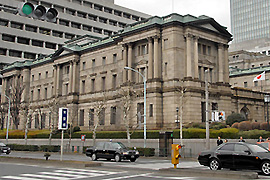Japan opposition vetoes bank boss
Block on government candidate leaves top central bank job vacant amid credit crisis.

The government has said it has no plans to submit another candidate in place of its nominee, Toshiro Muto, and urged the opposition to reconsider its veto.
“The government has put forward its best proposal, so we need to continue efforts to gain understanding on this,” Fukushiro Nukaga, the Japanese finance minister, told reporters.
Opposition MPs had earlier voiced concerns that Muto, a former finance ministry bureaucrat, was too close to the government and would not preserve the central bank’s independence.
Policy vacuum
 |
| The governor of the Bank of Japan must be approved by both houses of parliament [AP] |
The current governor, Toshihiko Fukui, is due to retire next week, threatening to leave a vacuum in Japanese monetary policy at a time when the world’s biggest central banks are working together to ease the global credit crunch.
Nerves are also on edge in Japan over a possible recession in the US, Japan‘s largest export market, and a slowdown – possibly also a recession – this year in Japan itself.
Wednesday’s vote also saw the opposition reject one of the government’s two nominees for deputy governor but approve the other, retired central bank official Masaaki Shirakawa.
He is likely to take over as caretaker governor unless the row is quickly resolved.
Clashes
The opposition veto of Muto as central bank governor is also thought to have been fuelled by anger towards the ruling Liberal Democratic party, which has used its majority in the more powerful lower house to push through some bills that require approval from only that chamber.
The appointment of the central bank governor has to be approved by both houses of parliament.
Last month the government bulldozed state budget legislation through the lower house of parliament, after the opposition boycotted a vote saying there had not been enough deliberation.
Earlier this year Fukuda used his coalition’s two-thirds majority in the lower house to force through a bill reviving a Japanese naval support mission in the Indian ocean for US-led forces, overriding opposition objections.
The move marked the first time in more than half a century that the government had used its lower house majority to override an upper house veto.